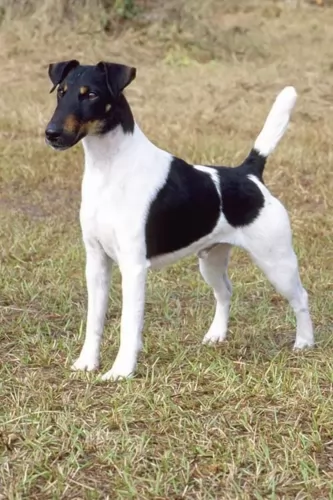 Petzlover
Petzlover Fox Terrier (Smooth) is originated from United Kingdom but Saarlooswolfhond is originated from Netherlands. Fox Terrier (Smooth) may grow 34 cm / 13 inches shorter than Saarlooswolfhond. Fox Terrier (Smooth) may weigh 36 kg / 79 pounds lesser than Saarlooswolfhond. Fox Terrier (Smooth) may live 3 years more than Saarlooswolfhond. Both Fox Terrier (Smooth) and Saarlooswolfhond has almost same litter size. Fox Terrier (Smooth) requires Moderate Maintenance. But Saarlooswolfhond requires Low Maintenance
Fox Terrier (Smooth) is originated from United Kingdom but Saarlooswolfhond is originated from Netherlands. Fox Terrier (Smooth) may grow 34 cm / 13 inches shorter than Saarlooswolfhond. Fox Terrier (Smooth) may weigh 36 kg / 79 pounds lesser than Saarlooswolfhond. Fox Terrier (Smooth) may live 3 years more than Saarlooswolfhond. Both Fox Terrier (Smooth) and Saarlooswolfhond has almost same litter size. Fox Terrier (Smooth) requires Moderate Maintenance. But Saarlooswolfhond requires Low Maintenance
 The Smooth Fox Terrier is one of two Fox Terrier breeds, the other being the Wirehaired Fox Terrier. Fox Terriers are believed to be one of the oldest terrier breeds and the ancestor of many terriers who came after. The Fox Terrier was recognized by the American Kennel Club in 1885 and the smooth Fox Terrier as a separate breed 100 years later in 1985. Some clubs still consider the two types of Fox Terriers as the same breed. The standard for smooth Fox Terrier was written in 1876 but not accepted until 1985.
The Smooth Fox Terrier is one of two Fox Terrier breeds, the other being the Wirehaired Fox Terrier. Fox Terriers are believed to be one of the oldest terrier breeds and the ancestor of many terriers who came after. The Fox Terrier was recognized by the American Kennel Club in 1885 and the smooth Fox Terrier as a separate breed 100 years later in 1985. Some clubs still consider the two types of Fox Terriers as the same breed. The standard for smooth Fox Terrier was written in 1876 but not accepted until 1985.
Both breeds of Fox Terriers are thought to originate in the late 1800’s descended from various British Terriers, the beagle, the dachshund and the Fox Hound. The Smooth Fox Terrier has a base coat that is white. The hunters bred them this way, so they would not mistake them for the fox during the hunt. They have also been very successful in prestigious dog shows including Crufts in England and New York Westminster in the United States.
They are not that popular today unless you are hunting and showing them in Confirmation Competitions. However, the Smooth Fox Terrier is significant because of all the terriers that consider it their direct ancestor. This would include the Jack Russel, the Rat Terrier and the Miniature Fox Terrier.
 Dutch breeder Leendert Saarloos began to breed German Shepherds to a European wolf. His goal was to bring out a dog that was more hard working.
Dutch breeder Leendert Saarloos began to breed German Shepherds to a European wolf. His goal was to bring out a dog that was more hard working.
The Dutch Kennel Club recognized this dog breed in 1975, and to give honor to the breeder, they gave the name to the dog - Saarloos Wolfdog. The dog was also recognized by the Federation Cynologique Internationale.
Today the Saarloos is regarded as a pet and companion. It was in 2015 that a study found that this dog showed more genetic association with the gray wolf.
 The Smooth Fox Terrier is distinguished from the Wirehaired and other terriers by his V-shaped head and white based coat. The coat can have tan, black and black and tan marks on the white coat. The Smooth Fox Terrier is sturdy, strong, sleek and symmetrical. The breed has a short back, and proportioned legs. The Smooth Fox Terrier has a flat skull and tapered muzzle. The nose is black, and the eyes are dark. He has v-shaped ears and a docked tail. Docking is no longer legal throughout the United Kingdom.
The Smooth Fox Terrier is distinguished from the Wirehaired and other terriers by his V-shaped head and white based coat. The coat can have tan, black and black and tan marks on the white coat. The Smooth Fox Terrier is sturdy, strong, sleek and symmetrical. The breed has a short back, and proportioned legs. The Smooth Fox Terrier has a flat skull and tapered muzzle. The nose is black, and the eyes are dark. He has v-shaped ears and a docked tail. Docking is no longer legal throughout the United Kingdom.
 The Saarloos Wolfdog is a large dog standing at between 60–75cm male and female and weighing between 30 and 45kg. He is athletic and muscular with a short, dense coat. Colors are wolf-grey, white and red. The Saarloos has wolf-like expressions so the ears are erect, the muzzle pointed and the tail long and plumed. They eyes are a yellow color. The face is bright and alert, showing how intelligent he is.
The Saarloos Wolfdog is a large dog standing at between 60–75cm male and female and weighing between 30 and 45kg. He is athletic and muscular with a short, dense coat. Colors are wolf-grey, white and red. The Saarloos has wolf-like expressions so the ears are erect, the muzzle pointed and the tail long and plumed. They eyes are a yellow color. The face is bright and alert, showing how intelligent he is.
The Saarloos Wolfhound is full of energy so will be looking toward his owner to come up with good exercise for him.
A walk will always be welcome, but for such a lively dog, he’ll want something more energetic such as a hike, swimming, being allowed to run off his leash in the park and lots of vigorous ball- and rope games.
He is an independent dog and for this reason you’ll want him trained and socialized to make him obedient. He is loyal and loving but some of his wolf-like characteristics might mean that he isn’t a good choice for the first-time dog owner. If the first time dog owner is firm, consistent, strong and kind, then everything will be alright.
 Children friendliness They shouldn’t be trusted with young children but if raised with older children ok
Children friendliness They shouldn’t be trusted with young children but if raised with older children ok
They are good at performing tricks, Search and rescue, narcotics detection, tracking, and disability assistance.
Fox Terrier is adaptable and can live anywhere. He is not a big dog but remember he is very high energy.
They have very good learning ability and are very intelligent but can be stubborn
 The Saarloos Wolfhound is a beautiful wolf-like dog that is full of life and energy. When you bring him into your life, you’re going to to have a wonderful addition to your family.
The Saarloos Wolfhound is a beautiful wolf-like dog that is full of life and energy. When you bring him into your life, you’re going to to have a wonderful addition to your family.
He is an independent dog that is strong-willed so it pays to have him trained and socialized, and then he becomes a balanced, well mannered dog that is loving and loyal with his beloved human family.
 One of the major problems for the Smooth Fox Terrier that the Wirehaired does not face is the potential for deafness. This is an issue in dogs that are mostly white in color. Other concerns that he does share with the Wirehaired Terrier are:
One of the major problems for the Smooth Fox Terrier that the Wirehaired does not face is the potential for deafness. This is an issue in dogs that are mostly white in color. Other concerns that he does share with the Wirehaired Terrier are:
Causes muscle weakness and problems swallowing.
 A well bred Saarloos Wolfhound is regarded as very healthy, and with good care they can reach up to 12, 13, 14 or 15 years of age.
A well bred Saarloos Wolfhound is regarded as very healthy, and with good care they can reach up to 12, 13, 14 or 15 years of age.
This is a common canine disease which comes about when a dog’s hip joints don’t develop properly. For a dog diagnosed with hip dyslasia it can be painful lying down and getting around.
Hip dysplasia is a genetic condition, but diet also plays a part as well as environmental factors. All dogs breeds are susceptible to hip dysplasia. Try and avoid your dog putting on too much weight as then it puts excessive strain on the joints. There are different treatment options to make it more comfortable for your pet.
 Feed 2-3 meals per day and divide 1/8-1/4 cup
Feed 2-3 meals per day and divide 1/8-1/4 cup
Feed two meals per day and divide ½ cup
hearing and vision
The Smooth Fox Terrier is an athlete requiring a lot of exercise. Take him on long walks and play with him in a large fenced yard. Don’t coup him up in the house. Be careful not to exercise him off leash as he will chase anything that moves and will not come when called. They need mental stimulation as well as physical. They are good at hunting, agility, tracking, performing tricks and being a watchdog.
 He’s an active dog so he will need a good dose of exercise to keep that muscular, lean look.
He’s an active dog so he will need a good dose of exercise to keep that muscular, lean look.
You will need to brush the dense double coat twice a week to ensure the removal of loose hairs and to keep the coat shiny and glossy. Trim his nails and check inside his mouth as he can’t tell you when he has a rotten tooth which can cause a lot of pain.
Feed puppies 4x a day.
Puppies 6 months on can have 2 meals a day.
Always feed your dog premium-quality dry food. Twice a week you can add home-made food to the dry kibble as a tasty treat. Add boiled chicken, brown rice or pasta and spinach, sweet potatoes and carrots. This food can all be chopped up and a portion added to the kibble. The rest can be frozen and then a portion warmed up for another meal.
Try and add some raw meat to his food occasionally as this helps to keep skin problems at bay.
Ensure there is always a bowl of fresh, cool water within his reach.
Your pet needs a warm, dry, comfortable place to sleep to call his own.
If your dog spends a lot of time outdoors, make sure there is both shade and sun.
Spaying and Neutering – beneficial if you don’t want puppies.
Vaccinations for puppies and adults to stave off deadly canine diseases.